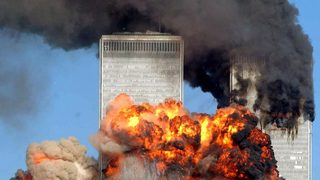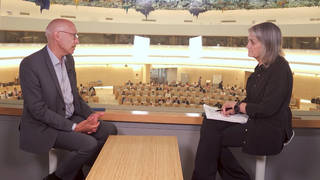
Guests
- Ayad Al-Qazzazprofessor of sociology at California State University, Sacramento. He was born in Iraq and immigrated to the United States in the 1960s.
As the US occupation of Iraq enters its sixth year, we turn to an Iraqi American voice to get a rarely heard perspective on the war. Ayad Al-Qazzaz is a professor of sociology at California State University, Sacramento. He was born in Iraq and immigrated to the United States in the 1960s. [includes rush transcript]
Transcript
JUAN GONZALEZ:
More than 200 people were arrested Wednesday in dozens of protests nationwide to mark the fifth anniversary of the invasion of Iraq. People took to the streets from San Francisco to New York to voice their opposition to the ongoing US occupation.
For the past few days, we’ve been bringing you the voices of US veterans and active-duty soldiers testifying at the Winter Soldier hearings in Silver Spring, Maryland. Today, we turn to an Iraqi American voice to get a perspective on the Iraq war as it enters its sixth year.
AMY GOODMAN:
Ayad al-Qazzaz is a professor of sociology at Cal State, California State University, Sacramento. He was born in Iraq, immigrated to the United States in the ’60s. He joins us from Sacramento.
Welcome to Democracy Now!
AYAD AL-QAZZAZ:
Thank you.
AMY GOODMAN:
It’s good to have you with us. Your thoughts, as we enter the sixth anniversary of the invasion of Iraq?
AYAD AL-QAZZAZ:
I am very, very devastated about what is happening to Iraq. You see, I immigrated to this country in 1963, and I adopted this country as my own new country. But I feel very, very much torn about what’s happening in my country of origin, devastated, that country, on all levels — economic, educational, health. And the infrastructure has been destroyed. The families have been displaced. More than four-and-a-half million Iraqis have left the country, and on and on and on. So I feel terrible about what’s really going on.
JUAN GONZALEZ:
And when you hear President Bush and other supporters of the administration’s policies talking about how the surge is working, how the US is now winning the war in Iraq, what is your response?
AYAD AL-QAZZAZ:
You know, one of the most devastating things is to hear the President keep lying and lying about really what’s going on in Iraq. He lied about the causes of the war, he lied about what’s going on right now in Iraq, and he’s lying about the surge.
Let’s talk about the surge. The success is nothing but a camouflage, nothing but a mirage. Baghdad, for example, was a mixed city, where Shia Muslim, Sunni Muslim and Kurdish, they lived together. And I give you an example of that. My family, I come from a family, my mother was Kurdish, my ex-wife happened to be a Christian Catholic from Baghdad, my brother married to a Shia Muslim, my sister married to a Shia Muslim. And right now, the ethnic cleansing is completely — has been completed in Iraq as a result of the surge in this year. Today, if you go and visit Baghdad, you see a few Sunni communities surrounded by walls or concrete blocks or many, many checks. They try to protect themselves from the other communities in that city. Baghdad, before the invasion, was 65 percent Sunni Muslim. Today, they are 75 [percent] Muslim Shia in Baghdad.
The second point about the surge — I already told you about four-and-a-half million Iraqis have been displaced — two-and-a-half million left the country, and two [million] others are displaced within their own country. And the only reason why no more people are leaving the country, because both Syria and Jordan practically closed their border to the Iraqi refugees.
And the third thing is that the US established a Sunni militia in the Anbar area and other places, and the purpose of that militia is basically to protect the American Army from the resistance movement. So, in a sense, they are doing the dirty work for the Americans in that neighborhood. The US, when they invaded Iraq, they had many, many objectives to achieve, and one of that objective is to divide the country into semi- three independent states, and these three semi-independent states will fight with each other about resources, about territory, and then they will ask the Americans to establish bases in their own respective territories.
AMY GOODMAN:
Professor Al-Qazzaz, is the US arming the competing militias?
AYAD AL-QAZZAZ:
That’s exactly correct, because, remember what I said, an important reason for the invasion of Iraq is to divide the country into semi-independent states. They already armed the Kurdish militia in the past. There is also the Shia militia. So they needed another militia, a Sunni militia, so these three militias, they will compete with each other in the future about territory and about resources. And then, as I already pointed out to you, they will ask the Americans to be the broker between them, because, remember, the problem with the US foreign policy, they always viewed Iraq as a danger to their foreign policy. They view Iraq has the potential to be a regional power in that neighborhood. Iraq has the resources to be a regional power. They have oil. They have a very well-educated middle class. And they have arable land, where they can, if it’s used efficiently and correctly, produce a lot of food to feed not only the Iraqi, but many other people in that neighborhood.
JUAN GONZALEZ:
Well, the Bush administration obviously argued that under Saddam Hussein, Iraq was a threat to its neighbors and a threat to the United States, but now, obviously, Saddam Hussein is long gone, and the argument now is that if the United States were to leave, there would be threats again to neighbors unless stability is first assured. Your response to what it would take for the United States to get out and what would happen if it did immediately?
AYAD AL-QAZZAZ:
You see, my own feeling, they should leave immediately, because the majority of the Iraqi already have said that a major problem in Iraq today is the presence of the occupying forces. And if the occupying forces leave as soon as possible, an important element of that problem would be removed. The Iraqis, they were able to resolve their problems before the invasion. They lived together for decades and decades and decades, and they do have the capacity to live together after the American forces leave Iraq. So I do not believe in the argument that we are here to help the Iraqis to resolve their problems. We’ve contributed to the problem. We have created the problem. And therefore, we have to leave in order to allow the Iraqi the breathing space so they can resolve the problem among themselves.
AMY GOODMAN:
Your sense of the candidates running for president, where they would take us?
AYAD AL-QAZZAZ:
You see, I don’t — the differences between the Democrats and the Republicans is not that much. McCain openly said that we should stay as long as we needed. And on occasion, he said we can stay all for another hundred years. I also do not honestly trust neither the Democratic candidates, Obama or Hillary Clinton, because both of them, they talk about leaving a residual element of the American forces in Iraq. And when they talk about an element of residual forces, they talk almost about a 50,000 or 60,000 Americans to stay in Iraq. So they way I look at it, both of them, they want to continue the occupation of Iraq, but under a different name and a different cover.
AMY GOODMAN:
Professor Al-Qazzaz, the students that you teach at Cal State, how have their views changed since the invasion five years ago?
AYAD AL-QAZZAZ:
Well, that’s very interesting. Let me make two comments on that. Number one, their level of information is still very, very minimum. They still don’t know much about really what is going on, and that is one of the most disturbing things what’s happening.
Number two, many of them are opposing the war, but unfortunately the opposition is not based on a genuine opposition to the war as a way to resolve a problem. They are opposing the war on the basis we are not winning the war, and that is really the most disturbing things, which I have noticed among my students, but also among many people in Sacramento city. Their opposition is not based on a moral or ethical or legal opposition. It is based on the fact we are not winning the war. And therefore, we have a lot of duties to educate the people about what is really going on about Iraq and about using war as a way to resolve a conflict.
AMY GOODMAN:
Professor Al-Qazzaz, before we go, you do an interesting exercise in your class that involves your students drawing maps. Can you tell us the results?
AYAD AL-QAZZAZ:
Yeah, I do that every time I teach a class on the sociology of the Middle East. At the beginning of the course, or the second week or the third week, I give them a test on the map. And surprisingly, I ask them to locate the countries of the Middle East and the Arab countries, and surprisingly, many, many of them, they don’t know what is the location of Iraq or many other Middle Eastern countries or Arab countries.
But one of the most surprising things, I came across a woman who served in Iraq two years in the American forces, and when she took the test map, she flunked the test. She mislocated Iraq, she mislocated Saudi Arabia, and she mislocated Kuwait. And I think that gives me an idea about honestly what is going on in Iraq.
AMY GOODMAN:
Ayad Al-Qazzaz, we want to thank you very much for being with us, professor of sociology at Cal State, at California State University in Sacramento.












Media Options